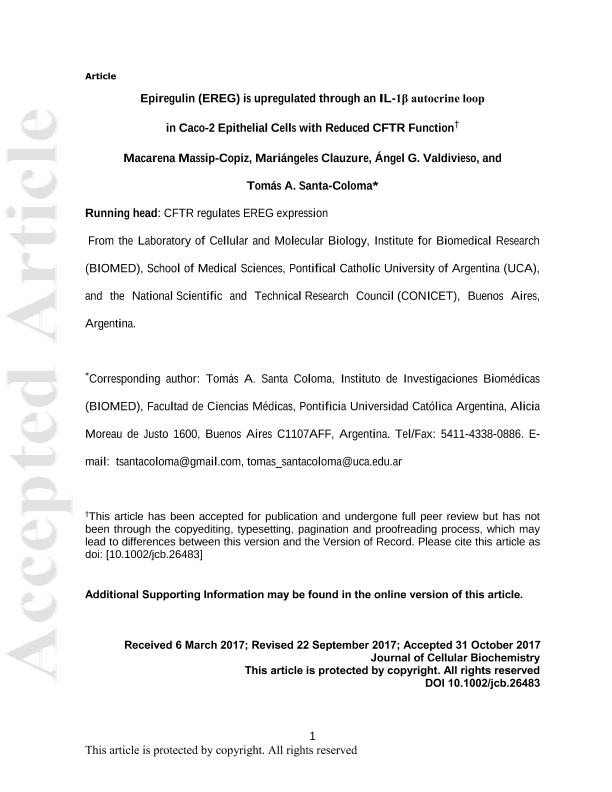Mostrar el registro sencillo del ítem
dc.contributor.author
Massip Copiz, María Macarena

dc.contributor.author
Clauzure, Mariangeles

dc.contributor.author
Valdivieso, Ángel Gabriel

dc.contributor.author
Santa Coloma, Tomás Antonio

dc.date.available
2018-06-14T14:49:06Z
dc.date.issued
2017-11
dc.identifier.citation
Massip Copiz, María Macarena; Clauzure, Mariangeles; Valdivieso, Ángel Gabriel; Santa Coloma, Tomás Antonio; Epiregulin (EREG) is upregulated through an IL‐1β autocrine loop in Caco‐2 epithelial cells with reduced CFTR function; Wiley-liss, Div John Wiley & Sons Inc; Journal of Cellular Biochemistry; 119; 3; 11-2017; 1-34
dc.identifier.issn
0730-2312
dc.identifier.uri
http://hdl.handle.net/11336/48628
dc.description.abstract
CFTR is a cAMP-regulated chloride channel, whose mutations produce cystic fibrosis. The impairment of CFTR activity increases the intracellular Cl- concentration, which in turn produces an increased interleukin-1β (IL-1β) secretion. The secreted IL-1β then induces an autocrine positive feedback loop, further stimulating IL-1β priming and secretion. Since IL-1β can transactivate the epidermal growth factor receptor (EGFR), we study here the levels of expression for different EGFR ligands in Caco-2/pRS26 cells (expressing shRNA against CFTR resulting in a reduced CFTR expression and activity). The epiregulin (EREG), amphiregulin (AREG) and heparin binding EGF like growth factor (HBEGF) mRNAs, were found overexpressed in Caco-2/pRS26 cells. The EREG mRNA had the highest differential expression and was further characterized. In agreement with its mRNA levels, Western blots (WB) showed increased EREG levels in CFTR-impaired cells. In addition, EREG mRNA and protein levels were stimulated by incubation with exogenous IL-1β and inhibited by the Interleukin 1 receptor type I (IL1R1) antagonist IL1RN, suggesting that the overexpression of EREG is a consequence of the autocrine IL-1β loop previously described for these cells. In addition, the JNK inhibitor SP600125, and the EGFR inhibitors AG1478 and PD168393, also had an inhibitory effect on EREG expression, suggesting that EGFR, activated in Caco-2/pRS26 cells, is involved in the observed EREG upregulation. In conclusion, in Caco-2 CFTR-shRNA cells, the EGFR ligand EREG is overexpressed due to an active IL-1β autocrine loop that indirectly activates EGFR, constituting new signaling effectors for the CFTR signaling pathway, downstream of CFTR, Cl- and IL-1β.
dc.format
application/pdf
dc.language.iso
eng
dc.publisher
Wiley-liss, Div John Wiley & Sons Inc

dc.rights
info:eu-repo/semantics/openAccess
dc.rights.uri
https://creativecommons.org/licenses/by-nc-sa/2.5/ar/
dc.subject
Cftr
dc.subject
Cystic-Fibrosis
dc.subject
Epiregulin-Ereg
dc.subject
Il-1beta
dc.subject.classification
Otras Ciencias Biológicas

dc.subject.classification
Ciencias Biológicas

dc.subject.classification
CIENCIAS NATURALES Y EXACTAS

dc.title
Epiregulin (EREG) is upregulated through an IL‐1β autocrine loop in Caco‐2 epithelial cells with reduced CFTR function
dc.type
info:eu-repo/semantics/article
dc.type
info:ar-repo/semantics/artículo
dc.type
info:eu-repo/semantics/publishedVersion
dc.date.updated
2018-06-13T15:08:07Z
dc.journal.volume
119
dc.journal.number
3
dc.journal.pagination
1-34
dc.journal.pais
Estados Unidos

dc.journal.ciudad
Nueva York
dc.description.fil
Fil: Massip Copiz, María Macarena. Pontificia Universidad Católica Argentina "Santa María de los Buenos Aires". Instituto de Investigaciones Biomédicas. Consejo Nacional de Investigaciones Científicas y Técnicas. Oficina de Coordinación Administrativa Houssay. Instituto de Investigaciones Biomédicas; Argentina
dc.description.fil
Fil: Clauzure, Mariangeles. Pontificia Universidad Católica Argentina "Santa María de los Buenos Aires". Instituto de Investigaciones Biomédicas. Consejo Nacional de Investigaciones Científicas y Técnicas. Oficina de Coordinación Administrativa Houssay. Instituto de Investigaciones Biomédicas; Argentina
dc.description.fil
Fil: Valdivieso, Ángel Gabriel. Pontificia Universidad Católica Argentina "Santa María de los Buenos Aires". Instituto de Investigaciones Biomédicas. Consejo Nacional de Investigaciones Científicas y Técnicas. Oficina de Coordinación Administrativa Houssay. Instituto de Investigaciones Biomédicas; Argentina
dc.description.fil
Fil: Santa Coloma, Tomás Antonio. Pontificia Universidad Católica Argentina "Santa María de los Buenos Aires". Instituto de Investigaciones Biomédicas. Consejo Nacional de Investigaciones Científicas y Técnicas. Oficina de Coordinación Administrativa Houssay. Instituto de Investigaciones Biomédicas; Argentina
dc.journal.title
Journal of Cellular Biochemistry

dc.relation.alternativeid
info:eu-repo/semantics/altIdentifier/doi/http://dx.doi.org/10.1002/jcb.26483
dc.relation.alternativeid
info:eu-repo/semantics/altIdentifier/url/https://onlinelibrary.wiley.com/doi/abs/10.1002/jcb.26483
Archivos asociados
